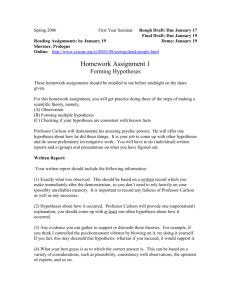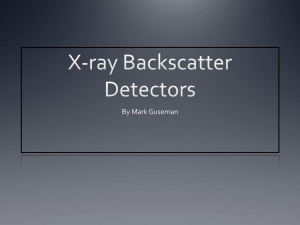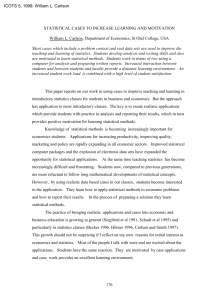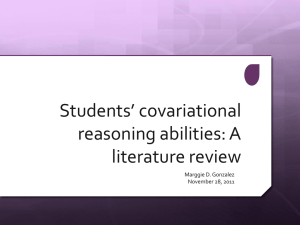profile part 2 c.m.
advertisement
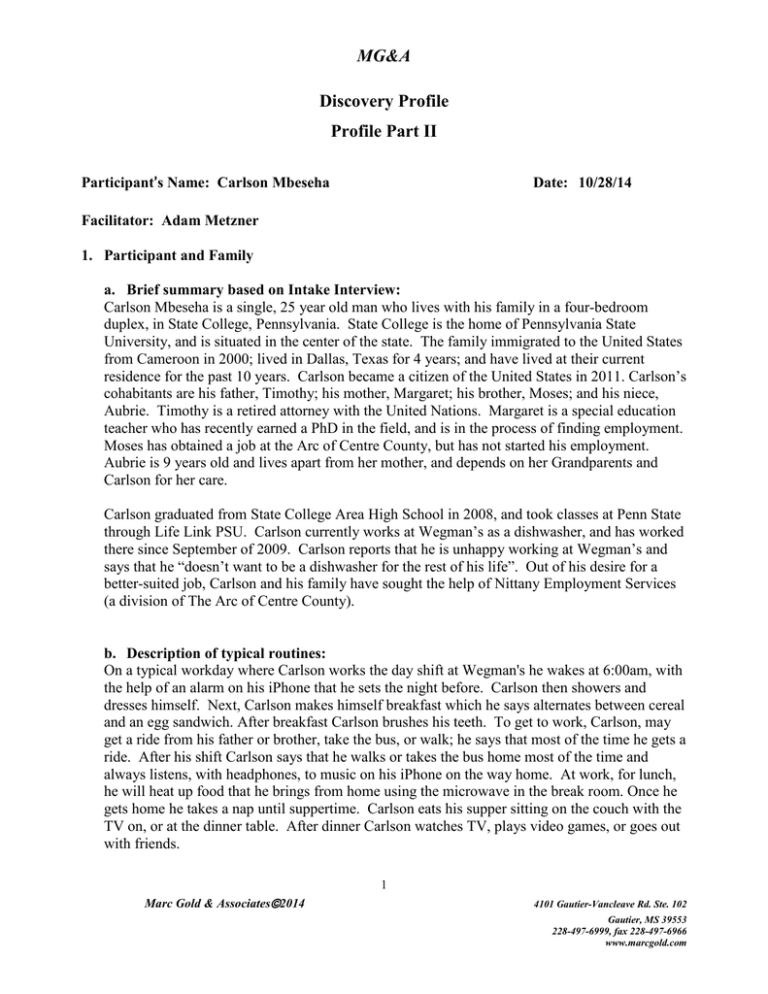
MG&A Discovery Profile Profile Part II Participant’s Name: Carlson Mbeseha Date: 10/28/14 Facilitator: Adam Metzner 1. Participant and Family a. Brief summary based on Intake Interview: Carlson Mbeseha is a single, 25 year old man who lives with his family in a four-bedroom duplex, in State College, Pennsylvania. State College is the home of Pennsylvania State University, and is situated in the center of the state. The family immigrated to the United States from Cameroon in 2000; lived in Dallas, Texas for 4 years; and have lived at their current residence for the past 10 years. Carlson became a citizen of the United States in 2011. Carlson’s cohabitants are his father, Timothy; his mother, Margaret; his brother, Moses; and his niece, Aubrie. Timothy is a retired attorney with the United Nations. Margaret is a special education teacher who has recently earned a PhD in the field, and is in the process of finding employment. Moses has obtained a job at the Arc of Centre County, but has not started his employment. Aubrie is 9 years old and lives apart from her mother, and depends on her Grandparents and Carlson for her care. Carlson graduated from State College Area High School in 2008, and took classes at Penn State through Life Link PSU. Carlson currently works at Wegman’s as a dishwasher, and has worked there since September of 2009. Carlson reports that he is unhappy working at Wegman’s and says that he “doesn’t want to be a dishwasher for the rest of his life”. Out of his desire for a better-suited job, Carlson and his family have sought the help of Nittany Employment Services (a division of The Arc of Centre County). b. Description of typical routines: On a typical workday where Carlson works the day shift at Wegman's he wakes at 6:00am, with the help of an alarm on his iPhone that he sets the night before. Carlson then showers and dresses himself. Next, Carlson makes himself breakfast which he says alternates between cereal and an egg sandwich. After breakfast Carlson brushes his teeth. To get to work, Carlson, may get a ride from his father or brother, take the bus, or walk; he says that most of the time he gets a ride. After his shift Carlson says that he walks or takes the bus home most of the time and always listens, with headphones, to music on his iPhone on the way home. At work, for lunch, he will heat up food that he brings from home using the microwave in the break room. Once he gets home he takes a nap until suppertime. Carlson eats his supper sitting on the couch with the TV on, or at the dinner table. After dinner Carlson watches TV, plays video games, or goes out with friends. 1 Marc Gold & Associates©2014 4101 Gautier-Vancleave Rd. Ste. 102 Gautier, MS 39553 228-497-6999, fax 228-497-6966 www.marcgold.com MG&A If Carlson works the closing shift or has a day off then he wakes between 10am and 12pm. Carlson says this is the case because he is often up late watching TV, playing videos, or out with his friends. Carlson says that if he doesn't have to be somewhere or has an appointment, then he will often lay in bed and watch TV until he "is ready" to take a shower and get dressed. Carlson will then make breakfast and eat it while sitting on the couch, watching music videos or a TV program. For lunch he eats at home and says that he usually has leftovers that he heats in the microwave. On his days off he works on basic education skills with his Habilitation worker from the Arc, walks to downtown State College by himself, or hangs out with his friends. Throughout the entire day, except while working, Carlson has his iPhone out. Carlson reports that he receives around 200 text messages per day and spends much of his day reading them and replying. Carlson attends to his phone while he is eating, watching TV, working with Arc staff, playing video games, on the bus, walking, talking and interacting with family and friends, and laying in bed. He will only turn off his phone if he is taking a nap or at work. b. Family (or staff, as appropriate) supports: With the family vehicle, Carlson’s mother, father, and brother, provide him with transportation to doctor appointments, speech therapy, or to wherever he needs to go; though he often walks or uses public transportation independently. Carlson’s father and mother do the grocery shopping for the family, and cook dinner. Carlson receives support from the Arc of Centre County, through the divisions of Home and Community Habilitation (HCH) and Nittany Employment Services (NES). HCH provides Carlson with 10 hours of support, weekly, in becoming more independent at home and in the community, while NES provides an hour of employment services per week. Carlson’s habilitation worker from HCH goes with Carlson to his speech therapy appointments and participates with Carlson in the session. c. Family (Staff) and Personal Responsibilities: Carlson’s father, Timothy, is retired and has few commitments. Carlson’s mother, Margaret, established the Nwankem Benevolent Foundation, and is currently in Fontem, Cameroon, working at one of the foundation’s ongoing projects, called the “St. Rita Foundation Nursery & Primary Inclusive School”. When in America and in State College, Margaret is present and available to Carlson, because she is searching for employment in her field and attending to the business of her Foundation, which is all done at the home. Carlson’s brother, Moses, has just obtained part time employment, which he describes as flexible, and around 20 hours per week. d. Physical and health related issues: Carlson has been diagnosed with Cardiomyopathy and Polyvavular disease, for which he has been prescribed two medications. Carlson takes the medications daily without assistance or reminders. The doctor has advised that Carlson avoid any “vigorous” exercise. 2 Marc Gold & Associates©2014 4101 Gautier-Vancleave Rd. Ste. 102 Gautier, MS 39553 228-497-6999, fax 228-497-6966 www.marcgold.com MG&A 2. Educational Experiences a. Overall Educational Experiences: Carlson graduated from State College Area High School in June of 2008. He continued to take classes at Penn State through Life Link PSU until September of 2009. At all of his Life Link PSU classes, Carlson had a perfect attendance record, and has never “skipped school”, throughout his academic career. In high school, Carlson took some classes in the regular curriculum with the help of a learning aide, as well as segregated classes for students with different needs. Carlson went to elementary school in Cameroon, and was in regular classes without any supports, due to there being no Special Education programs available. In Dallas, Carlson was “mainstreamed” with supports through middle school. Carlson receives help in building upon his basic education skills through the Arc of Centre County in their HCH program. This involves a Habilitation worker coming to Carlson’s home, where they serve as a personal tutor. This occurs at his discretion on his days off from work and is always 10 hours a week, unless Carlson is sick or on vacation. b. Academic Programming: At State College Area High School, Carlson received “Life Skills” education, which includes curriculum in “Daily Living Skills”, “Employment Skills”, and “Self-Determination and Interpersonal Skills”. At Life Link PSU, Carlson chose to take classes in Ballroom Dancing, Yoga, and Tai Chi. He received an “A” in Ballroom Dancing and Yoga, but says that he looked forward to going to his Ballroom Dancing classes and that he would like to take more classes like that. Carlson’s personal habilitation (hab) worker has Carlson read from a book out loud, engage in conversation, and repeat a list of specific, job-related, words to build on his speech communication skills. The hab worker will hold a picture of a traffic light, with the green light showing, and then turn it to yellow, when Carlson is speaking too fast; she noted that Carlson rarely gets a yellow light when he is reading or using the job-specific list, but rarely has a green light when he is freely conversing. The hab worker worked with Carlson on his knowledge of traffic laws so that he could pass the learner’s permit test. To do this they used an iPad app that Carlson would use to take practice exams, after he read a paper copy of the handbook. Carlson was also given tests on paper, and 3 Marc Gold & Associates©2014 4101 Gautier-Vancleave Rd. Ste. 102 Gautier, MS 39553 228-497-6999, fax 228-497-6966 www.marcgold.com MG&A performed 20 to 40 points better on these, and when asked why did he think this was happening, he said the app’s had the time counting in the lower right corner, which he says makes him nervous. The hab worker also works with Carlson to build on his math and money handling skills, using modeling, then worksheets, followed by applying the knowledge in a simulation activity. So, Carlson watches the hab worker solve the problem, as they explain what they are doing, he then practices that method using worksheets, until he is ready to use the skill in a simulation, such as separating a stack of money into denominations, and then adding them together to get the total. c. Community/Recreation Programming: Carlson played soccer on his school’s soccer team in Dallas and then in State College, up until he was diagnosed with a heart condition, which forced him to withdraw from such activities. Carlson did not choose to engage in any other recreational programs. d. Vocational Experiences and Programming: Through the State College Area High School’s Transition program, Carlson was provided with 2 vocational experiences. The first was as a teacher’s assistant at Kindercare, a local daycare provider, which was 2 hours during the afternoon, 3 days a week, for the length of a school semester. Carlson assisted the teachers at Kindercare by reading to the children, leading them in organized games, playing with them, and getting them prepared for naptime. Carlson says that this was his “favorite job”, and that if he had his choice of jobs it would be “working with children”. The second was with Penn State’s Post Office as a mail carrier for the campus dorms, which was also for 2 hours during the afternoon, 3 days per week for a school semester. Carlson was responsible for sorting the mail at the post office, taking it to a Dormitory Mail Commons, and then putting the mail in the corresponding post boxes. Carlson says, “they didn’t want me to leave” and “I liked it”, but adds that “he preferred” his vocational experience at the daycare. The State College Area High School also provided “Employment Skills” training, in a classroom setting, which went over “soft skills”, finding employment, retaining employment, “skill sets”, and money management. 3. Employment and Related Activity a. Informal work performed at home and for others: 4 Marc Gold & Associates©2014 4101 Gautier-Vancleave Rd. Ste. 102 Gautier, MS 39553 228-497-6999, fax 228-497-6966 www.marcgold.com MG&A On his days off from work, Carlson will sometimes vacuum and straighten up the living room, wash the dishes, and sweep the kitchen floor. He also cleans his room, which entails picking up his clothes, making his bed, and vacuuming. b. Formal chores and responsibilities: Carlson has no formal chores, but is often responsible for watching over his nine year old niece who is living in his home, while her mother is in graduate school in Ohio. Carlson’s father commented that Carlson is “very good” with his niece, Aubrie, and said that he feels very comfortable leaving her in Carlson’s care. Carlson picks up Aubrie from the bus stop and walks her home. He makes her sandwiches and macaroni and cheese and always asks her to wash her hands. Carlson directs her to pick up after herself, and tells her that she can’t go outside and play until she puts away her toys, or takes her dishes to the sink. He also puts Aubrie to bed and will read to her until she falls asleep. c. Entrepreneurial activities: Carlson has not, as of yet, engaged in any entrepreneurial activities. d. Internships, structured work experiences, sheltered work, volunteering: Carlson had structured work experiences in high school as previously discussed. e. Wage employment: Carlson has worked at the local Wegman’s grocery store since September of 2008 as a dishwasher. Wegman’s was rated #5 on Fortune magazine’s list of the top 100 companies to work for in America, and has appeared on that list for the past 16 years. Carlson says that he “loves his boss” and “likes Wegman’s”, but doesn’t want to be a dishwasher for the rest of his life. Carlson was given an opportunity to work in the stockroom and to serve customers at the burrito bar. Carlson says that the stockroom job was not a good fit because of the heavy lifting, but reports that he likes serving customers at the burrito bar. The Chef in charge explains that the only reason that he hasn’t given Carlson more duties serving customers, like at the burrito bar is due to the coherence of his speech, and said that if the speech therapy that he is getting, improves this skill, he would reconsider. f. General areas of previous work interest: At Wegman’s, a job that Carlson performed and is interested in doing again, is bussing tables and cleaning the dining area. He says that his interest in this is largely because he prefers to interact and be around a wide variety of people. He added that an aspect of dishwashing that he doesn’t like is “being hidden” in the dish room. Carlson’s manager said that he doesn’t have him 5 Marc Gold & Associates©2014 4101 Gautier-Vancleave Rd. Ste. 102 Gautier, MS 39553 228-497-6999, fax 228-497-6966 www.marcgold.com MG&A bus tables is because he needs a dependable dishwasher, and already has bussing covered. At Wegman’s, Carlson was allowed to work at the Burrito bar on three occasions and desired to continue working at that station, but that position was eliminated as it became self serve. Carlson found this work desirable because it involved interacting with people, which he cites as being the main reason for this. Carlson is most interested in having a job like the one he had through his high school at Kindercare. He says that he that this was his best work experience and that working with children is the most rewarding thing that he has done, and in his words, the children made him “feel good”. 6 Marc Gold & Associates©2014 4101 Gautier-Vancleave Rd. Ste. 102 Gautier, MS 39553 228-497-6999, fax 228-497-6966 www.marcgold.com MG&A 4. Life Activities and Experiences a. Friends and social group(s): Carlson has many casual friends, and about a dozen that he calls close friends. Some of these friendships were formed in high school, others from work, or through mutual friends. His friends are male and female in equal proportion, and most are around the same age as him. Some of his friends have similar disabilities, but most do not. Carlson’s younger brother, Moses, participates in activities with his social group. Most of the socializing that this group does is at the bars and nightclubs in Downtown State College. b. Personal activities, including hobbies, performed at home: Carlson spends time at home, watching TV programs such as CSI, So You Think You Can Dance, Dancing With The Stars, American Idol, America’s Got Talent, Fuse Music Videos. He also watches NFL football games, and any kind of soccer match. Carlson listens to music at home, and uses his iPhone as an Mp3 player. He watches music videos on the TV and on YouTube. The music that he chooses to listen to falls under the categories of Rap, R & B, and Soul. His favorite artists are: Michael Jackson, Lil Wayne, Niki Minaj, and Whitney Houston. Much of Carlson’s time at home is spent using social media with his iPhone or on a laptop computer. He Skype’s with his mother when she is not at home, but he prefers to use FaceTime which he installed on his phone without assistance. c. Family/friend activities, including hobbies, performed at home: Carlson and his friends, or his brother, play video games on his PlayStation 2, in the guest bedroom of the family. They play Madden football or FIFA soccer. They watch sporting events in the living room, like World Cup Soccer, or NFL football. The family has dinner together sometimes, and will go out for dinner on occasion. The family typically eats in the living room, with the Television on. Carlson, his niece, and his brother, Moses, watch TV in the living room. Extended family members often visit from Ohio, Michigan, and Cameroon. When this happens, they will have many people in the house, and there is a party like atmosphere. Carlson says that he looks forward to these visits and that he has fun seeing everybody. d. Personal activities, including hobbies, performed in the community: Carlson goes for walks by himself around the neighborhood and also walks to the Downtown district of State College. On these walks, he puts on his headphones and listens to music on his iPhone. When he is downtown, he takes photos of things he finds interesting such as nightclubs, flyers for events, and exotic cars. 7 Marc Gold & Associates©2014 4101 Gautier-Vancleave Rd. Ste. 102 Gautier, MS 39553 228-497-6999, fax 228-497-6966 www.marcgold.com MG&A e. Family/friend activities, including hobbies, performed in the community: Carlson goes to dinner with friends and most of the time they take him, and pay, though he pays for himself on occasion. They dine at a restaurant called Café 210 West, among others. Carlson also meets his friends at bars or nightclubs at least twice a week. Most of the time, the planning of these events occurs through text messages. The clubs that they go to most frequently are Indigo, the Darkhorse Tavern, Levels, Pickles, and the Phyrst. Carlson prefers Indigo and Levels, because they are dance clubs, and dancing is the activity that Carlson chooses to engage in most often. He says that many times he finds himself at bars he doesn’t want to be at, because he feels like is part of the group, and “just goes along”. At these clubs, Carlson drinks beers, but most often only one or two, and says he is there to be with his friends and to meet new people, and never to “get drunk”. At a club, he leaves his group and walks around, and talks to people that he doesn’t know. f. Specific events and activities that are of critical importance: The Mbeseha family goes on vacation to Cameroon (in the African continent) for a month or two, once a year. Carlson is required to accompany the family, and he looks forward to seeing his extended family and childhood friends. This usually occurs in the fall or winter. Carlson’s current employer, Wegman’s, grants him this leave every year. 5. Description of Skills, Interests and Conditions in Life Activities a. Domestic/Home skills: Carlson cooks simple meals such as an egg sandwich. This entails cracking two eggs into a greased frying pan, whisking the eggs with a fork, and meanwhile toasting two pieces of bread, and then assembling the sandwich. Carlson uses the microwave to heat up leftovers, make macaroni and cheese, or a can of soup, which he opens with a manual can opener. After preparing a bowl of cereal he always twists the cereal bag until it is sealed, and puts it back in the cupboard. Carlson sweeps and mops the kitchen, and washes the dishes in the sink using soap, hot water, and a scrub pad. In the living room and bedroom, Carlson uses a vacuum cleaner without supervision. When done with the vacuum, he recoils the cord and puts it away. Carlson also makes his bed and hangs clean clothes in his closet. When he was young, and in Africa, Carlson had a golden retriever that he named Sherry. He took care of feeding, walking, and all other cares of the dog. He taught her tricks and gave her his attention everyday. When he left Africa and came to the United States, his family moved into apartments that would not allow dogs, so he was not allowed to have one and missed his dog. Carlson’s Habilitation Aide had brought her dog to meet Carlson, since he told her that he 8 Marc Gold & Associates©2014 4101 Gautier-Vancleave Rd. Ste. 102 Gautier, MS 39553 228-497-6999, fax 228-497-6966 www.marcgold.com MG&A missed having a dog. She reported that Carlson was “excellent” in his handling of her dog, and was able to get her to walk with him without a leash, and able to get her to do tricks. She said Carlson gave the dog his full attention, and gave her the impression that he was very interested in working with dogs. Carlson has said since that he would be interested in an employment situation where he was working with dogs. At Wegman’s there was a woman in a wheelchair with a Rottweiler service dog, and Carslon said that he was scared of that dog; when asked if he only liked certain breeds of dogs, he answered, “I love all dogs, I’m scared of the master”. When asked to explain this, he said that he knew the person, and said that he thought “she was mean, so she might train her dog to be mean”. He went on to clarify that he meant that dogs could be trained to be guard dogs or attack dogs, and that dogs behaviors are a result of the way they were trained or treated, so it is very important to train a dog responsibly. b. Community participation skills: Carlson is independent in fast food restaurants. At his favorite restaurant, McDonalds, it was observed that: he gets in line, waits his turn, orders his food in a clear voice, picks up his food when his number is called, and pours himself a soda using the drink dispenser. He asks for assistance in finding the right sized lid, and says that he is sometimes confused about which lid to put on his cup. While eating he checks his phone and texts responses to messages. Carlson accesses the bus on his own, by checking the bus schedule, which he keeps on the kitchen table. There are 3 bus lines that serve his location, so he checks the schedule to see which bus arrives next. It was observed that: he walks to the bus 10 minutes before the scheduled time, takes his bus token out as he gets there, boards the bus without accommodation, rings the bell right after the bus leaves the last stop before his stop, and then gets off the bus at the proper stop. While walking in the community, Carlson multitasks, by reading text messages and typing responses with one hand, while he holds his drink in the other hand. When he observes something of interest, he will stop and take pictures with his phone, and then text that picture to a friend. c. Recreation/leisure skills: Carlson plays Madden Football on his PlayStation 2 with a friend. When Carlson sets up the video game, it doesn’t come up at first, so: he checks the cables, sees that the power cord is not plugged in, and plugs it in. Carlson demonstrates adaptability through his gameplay, in that it was observed that he adjusts his plays and formations, according to his opponent’s strategy and patterns of play. His opponent in the Madden football game had played the game before, but had never used a PlayStation 2 game system or that type of controller, so he had to teach them. Carlson did this by pointing to the buttons and explaining what they did, such as pointing to the triangle button 9 Marc Gold & Associates©2014 4101 Gautier-Vancleave Rd. Ste. 102 Gautier, MS 39553 228-497-6999, fax 228-497-6966 www.marcgold.com MG&A and saying that button hikes the ball. When it came to kicking he was having difficulty in explaining the process, so he took their controller and told them to watch how he did it, which worked. d. Academic skills: Carlson earned his learner’s permit after passing the written exam and is now in the process of practicing his driving skills. He learns by driving around the school parking lot, following his father’s directions, and has advanced to driving the family car from the school parking lot to his home 5 miles away. His father stated that he will take him to the DMV to take the driving exam after 3 or 4 more times practicing, and anticipates that Carlson will have his driver’s license within a month. Carlson computes simple addition in his head, and adds several numbers of multiple digits on a piece of paper. Carlson is sometimes intimidated by subtraction and says that he can’t do it, but he has completed many subtraction exercises successfully. Carlson uses a multiplication table or a calculator to multiply and has memorized multiples of 2, 3, 5, and 10. Carlson counts money of differing denominations correctly most of the time, and is working on building his confidence in making change. When paying for things at a store or restaurant, he primarily uses his debit card. Carlson uses computers and mobile devices, such as iPhones and iPads, many times everyday. He types text messages throughout the day, and has figured out on his own how to use many apps on his iPhone. He writes what he is thinking or doing in paragraph form and posts it on his Facebook page. Carlson reads to his niece, and reads to himself, and when he doesn’t know a word he will ask someone what it means. He has a large pack of vocabulary flash cards that he uses to build his vocabulary. He takes out a card and says the word out loud, and if he has a hard time pronouncing it, he looks at the phonetic spelling and tries that, he then reads the definition out loud and uses the word in a sentence. e. Physical fitness skills: Carlson is restricted by his doctor from engaging in vigorous physical activity, but this pertains specifically to competitive sports and activities that would involve his heart beating very rapidly, and has had no bearing, so far, on his ability to perform work tasks. Carlson lifts trash cans, which when full, is in excess of 20 pounds, and he then dumps it into the compactor. Carlson stands on his feet at work for up to 10 hours in a day, with one 30 minute and two 15 minute breaks. On his days off Carlson walks to Downtown State College, which is nearly a mile away and it takes him under 15 minutes. He goes for walks around his neighborhood daily, and these walks 10 Marc Gold & Associates©2014 4101 Gautier-Vancleave Rd. Ste. 102 Gautier, MS 39553 228-497-6999, fax 228-497-6966 www.marcgold.com MG&A can be from anywhere between 15 minutes and an hour. Carlson goes out dancing and does this activity for anywhere between an hour and 4 hours. Carlson avoids going out in cold weather and rain. When Carlson is very cold it affects his performance and he loses his concentration, this was discovered when Carlson received a 10% grade on a subtraction worksheet, which was out of character. When asked by his habilitation worker why he did so poorly, he said that he was very cold because he was right under the air conditioner. When he moved to a warmer area, he completed a similar subtraction worksheet and received a 100% mark. When asked how being cold could make such a difference, he said “I can’t think of anything else, but being cold”. f. Arts and Talents: Carlson choreographed and performed a dance routine to the song thriller in front of an audience of over 150 people at a fundraising event for Haiti. A coworker described this performance as “astounding” and said that she found him to be “magnetic” as a dancer. Carlson’s father said that he started dancing at four years old and in his opinion is “very talented” in this art. In 2009, Carlson took a dance class at Penn State University and received an “A”, and he reports that he “loved” that class. Carlson goes to dance clubs in the area with his friends to practice and try out dance moves at least twice a week. Carlson had started his own dance club, which had over a dozen members, but has since dissolved because, according to Carlson, “they all moved away”. Carlson watches all dance shows that appear on television and said that if someone would film him dancing, he could send it to a show like, “So You Think You Can Dance” in hopes of getting an audition. Carlson says that he learns dance routines by watching videos over and over, using a modeling form of learning. Carlson’s Habilitation worker brought her dog to one of her sessions with Carlson, and he went over to it immediately and gave her his full attention. They took the dog for a walk and Carlson was able to keep the dog g. Communication skills: Carlson is seeing a speech therapist to improve on his speech communication, which she characterized as being “rapid to the point of incoherence” at times. He is seeing her, because it is his feeling that this has been an impediment to doing more desirable jobs at his place of employment. Through speech therapy Carlson now say things from a script with coherence in his therapist’s estimate. His therapist came up with a list of words and phrases that Carlson would likely say to customers if he were serving them in the food court; such as, “would you like to make that a combo meal?” or “would you like guacamole on your burrito”. He practiced these phrases, and the result is that he says these phrases coherently now. This strategy used pictures as cues, and it is anticipated that in the natural environment, the burrito bar in front of 11 Marc Gold & Associates©2014 4101 Gautier-Vancleave Rd. Ste. 102 Gautier, MS 39553 228-497-6999, fax 228-497-6966 www.marcgold.com MG&A him will serve as a natural cue. Using this strategy, of locating the deficits in his speech communication, along with what phrases are essential to his task, and what natural cues are available, it is probable that any speech communication problems that Carlson has at work, can be solved. Despite his speech impediment, Carlson, communicates through speaking, because he will repeat himself until he feels that he is understood. His speech therapist has been working with him so that he makes a conscious attempt to slow down his speech when he see’s that his speech is not being understood, instead of repeating what he said as rapidly as the first time. If someone doesn’t understand his speech, the strategy that works is to ask him to repeat what he said, and add “but slower this time”. Carlson also communicates with “body language” and by miming in the manner similar to playing “Charades”. When Carlson realizes that he is not being understood he will use his hands and body to act out what he is trying to say. When he said the word “fork” and was not understood, he started making a motion imitating stabbing a steak with a fork and then bringing it to his mouth. h. Social interaction skills: Carlson has a large smile and displays it in most social interactions, as well as a laugh involving the use of his whole body, where he leans over and holds his stomach. While pushing a large trash can with wheels through Wegman’s, he see’s a coworker and says “I hope it doesn’t rain later, when I get off”, the coworker responded by saying that it was supposed to be warm and sunny, and he looked up and raised his hands and “yes”, and laughed. Carlson’s coworkers, supervisors, habilitation workers, and friends said that Carlson is a “fun person to be around”, because he laughs and jokes frequently, and includes everyone present. In a social situation, such as a party, Carlson approaches people he doesn’t know and extends his hand, while introducing himself. If the person doesn’t say anything after saying their name, Carlson asks a question or makes a comment, such as “I love this music, what do you think?” Carlson engages in social interaction using social media many times a day. When he was eating at McDonald’s he used his iPhone to “check-in” on Facebook. On Facebook he has 2,486 friends and is posting comments, and “liking” and commenting on other people’s posts, throughout the day. Carlson uses an app on his iPhone called “Facetime” to have video chats with his friends and family. He also has an app on his phone that he uses called “Snapchat”, 12 Marc Gold & Associates©2014 4101 Gautier-Vancleave Rd. Ste. 102 Gautier, MS 39553 228-497-6999, fax 228-497-6966 www.marcgold.com MG&A where he takes a picture of himself or something around him and then sends it to a friend, who is supposed to then send a picture in response. i. Mobility skills: Carlson moves with ease around the dish room and does it with rhythm, and somewhat akin to a dancer, he spins and slides while maintaining his balance. Carlson bends to put pans on shelves 2 feet high, and stretches to place items on a shelf 6 and a half feet high. Carlson walks everyday without any supports, and has above average flexibility and agility, as displayed by his “A” grades in Yoga and dance classes at Penn State. When dancing during a performance in front of a large crowd he jumps, spins around, does complicated tap dancing style moves, and then slides across the floor. j. Sensory skills: (sight, hearing, smell, touch) Carlson does not experience deficiencies in any of his senses. k. Vocational skills: Carlson has vocational experience in the caring of children from his volunteer job with Kindercare, during high school. In caring for his niece Carlson displays skills translatable to this area of work. When his 9 year old, niece, Aubrie, disputes a direction that he gives her and has a tantrum, he is firm and calm, and after a few moments, follows the direction. When it is time for Aubrie to go to bed he asks her if she has brushed her teeth and washed up, if she says yes, he will examine her to see if she is being honest, and then will walk her to her bedroom, tuck her in, and then sit on the bed and read a story until she falls asleep, which only takes a few minutes. Aubrie follows Carlson around, whispers to him, and hugs him; she listens to Carlson when he directs her to do something, even if she does protest a little. Carlson has learned a complex routine of duties at Wegman’s that includes rinsing, washing, drying, sorting, and delivering dishes; taking the mechanism’s inside the dishwasher apart and then washing them by hand; filling three sinks with water, and making sure that the first has soapy water, the second, rinse water, and the third gets a sanitizing solution; safe use of a garbage disposal; safe handling of knives; unlocking and operating cardboard and trash compactors; an ordered collection of trash, recyclables, and cardboard from the various kitchen stations and their appropriate disposal; and cleaning and closing down the dish room. To accomplish all of these duties, one needs to do them speedily or they will not all get done or they will not get done on time. He also has had dining room duty, which involves busing tables and keeping the dining room clean. Carlson’s supervisor says that he is always done on time, and does not need any supports, nor does he use a written task list. The supervisor said that Carlson’s attendance and timeliness is “excellent” and described a time recently, when someone called off and he called Carlson to see if he could cover the shift and Carlson responded, “sure, Chef, be there as soon as I can!” 13 Marc Gold & Associates©2014 4101 Gautier-Vancleave Rd. Ste. 102 Gautier, MS 39553 228-497-6999, fax 228-497-6966 www.marcgold.com MG&A 6. Connections for Employment a. Potential connectors in family (or staff, as appropriate): Carlson’s brothers give Carlson advise about seeking employment, but do not have any local employment connections. His parents and brother, Moses, could take him to look for a job by driving him around the area looking for help wanted signs, but they don’t have many connections in the area. Most of the family’s friends and extended family are in other states or in Cameroon. Carlson’s sister worked at the nearby McDonald’s, and has connections there. b. Potential connectors among friends/neighbors and work colleagues: Carlson has numerous friends that may be able to provide employment connections and this should be explored more. c. Potential connection sites in community relationships: The speech therapist that Carlson sees is situated in the Easter Seals building, where they have a daycare program that is known to hire individuals with disabilities as teachers assistants. e. Potential connections through clubs, organizations, or groups (such as church or school): Carlson’s family belongs to the Our Lady of Victory congregation on Westerly Parkway, State College. Carlson and his family go to church only occasionally and rarely go to Church events, but are acquainted with several fellow churchgoers. The church has a daycare, nursery, and elementary school. Carlson’s school connections ended over 5 years ago, though he still keeps in touch with his learning aide, and some of his teachers and counselors, through Facebook. e. List of local employers (determined by proximity, relationships, interest areas, etc.): The State College area has a unemployment rate of 3.7% and there are 65,710 jobs with a median hourly wage of $16.69, according to the bureau of Labor Statistics. There are 7 daycares within 5 miles of Carlson’s home and they are all on bus routes or are close enough to walk (.5 mile). Radio Park Elementary School is just about 100 yards from his home, and there are 3 more schools in the area. There are numerous restaurants around where Carlson lives, and at least 30 within a half-mile. There is a Dairy Queen, Wendy’s, Subway, and McDonald’s, all just a 5-minute walk away. Carlson has shown interest in working at Wendy’s, and Subway is similar to the burrito bar position that he wanted to secure at Wegman’s. 14 Marc Gold & Associates©2014 4101 Gautier-Vancleave Rd. Ste. 102 Gautier, MS 39553 228-497-6999, fax 228-497-6966 www.marcgold.com MG&A There are Dog training businesses in the area: Good Foundations Canine Training; Manners and More, Dog Training; Mt Nittany Dog Training School; and Wags and Woofs. There is a Petco right across from Wegman’s. There are also 3 animal shelters and several dog rescues in the area. There is a Dance Academy that hires dance teachers, and there is a local African Dance Troupe that is affiliated with the University, and pays the dancers for their performances. 15 Marc Gold & Associates©2014 4101 Gautier-Vancleave Rd. Ste. 102 Gautier, MS 39553 228-497-6999, fax 228-497-6966 www.marcgold.com

